Texas Hold’em Hand Simulator
With our calculator, you can simulate any point in a Texas Hold’em hand: pre-flop, post-flop, the turn, or the river. Choose your cards, the cards for any number of opponents, and the community cards. You’ll instantly see the win probability for each hand.
Did you suffer a horrendous bad beat? Did you make the right decision in a poker hand or do you just think you did? With our Texas Hold’em hand calculator, you can know the odds in any situation for certain.
Table of Contents
How to Use My Texas Hold’em Simulator
To begin using this simulator, is simply click on the cards that you know are in play. This will start with your hole cards.
You click your cards and then navigate to another seat or to the board to insert the community cards on the flop, turn, and river. As you update the simulator with more players or community cards, the poker odds calculator will present you with a percentage of how likely each hand is to win.
Example Hands
Here are some common hand scenarios you can simulate using this calculator. Take inspiration from these, create your own, or duplicate a recent hand you played to see who was the favorite and when.
Small pocket pair vs. overcards
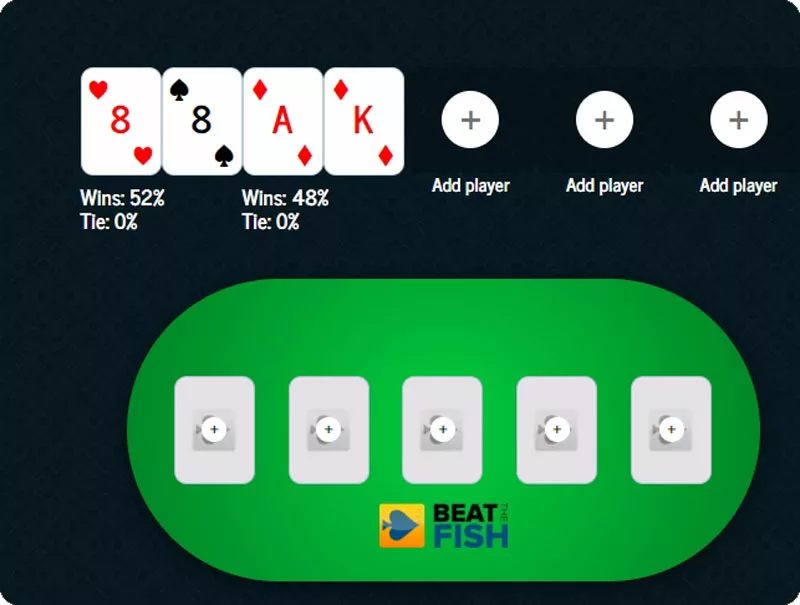
This is a classic example to demonstrate winning likelihoods of hands pre-flop. The scenario of a low pocket pair versus overcards is common in tournament play. It is often described as a “coin flip”, as the predicted winning percentage is about 50% each.
However, as you can see from setting this up in the calculator, a made pocket pair will always be at least a little favorable against unpaired cards.
The fact that even lowly pocket deuces are favored over Ace-King, one of the most popular hands to overplay in Texas Hold’em, is a good reminder that it’s always better to have a made hand rather than relying on the board to come.
Pocket Aces vs. Pocket Kings
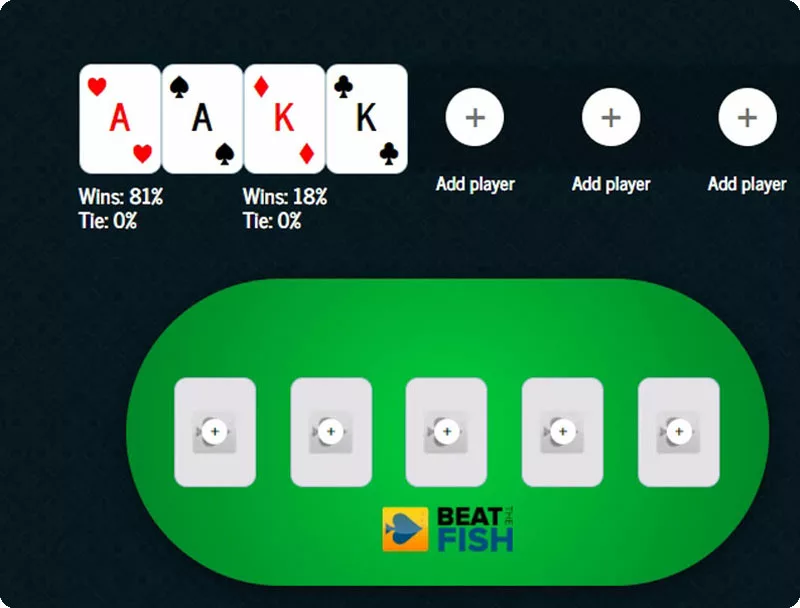
This is a volatile Texas Hold’em matchup in both tournament and cash game play, as it usually ends up with both players being all-in either before the flop or on the flop.
As you can see, pocket Aces are overwhelming favorites against pocket Kings before the flop. The Kings will need to hit a set with another King or a flush or straight with help from the turn or river.
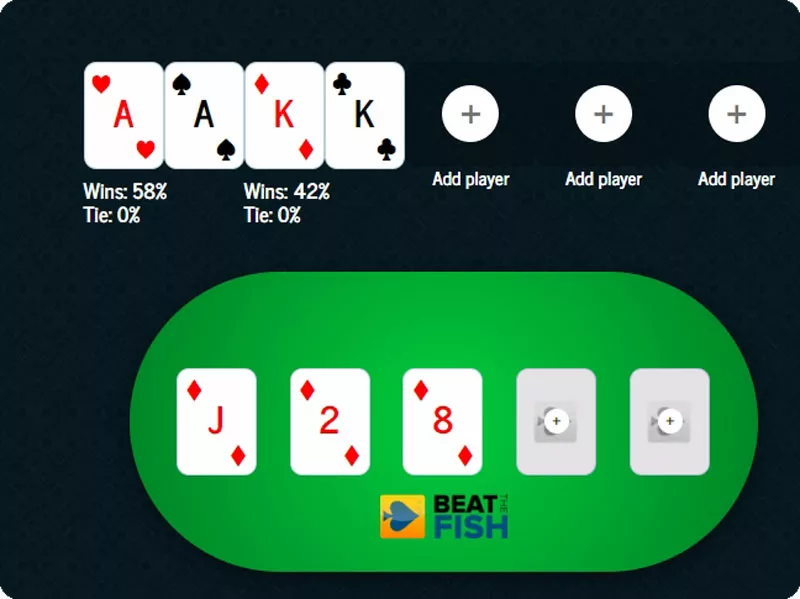
This is an interesting flop for this matchup and not particularly good for the pocket Aces. You can see that the pocket Kings are almost even money to win now. There are 9 diamonds it could hit for a flush, or still 2 more Kings for a set.
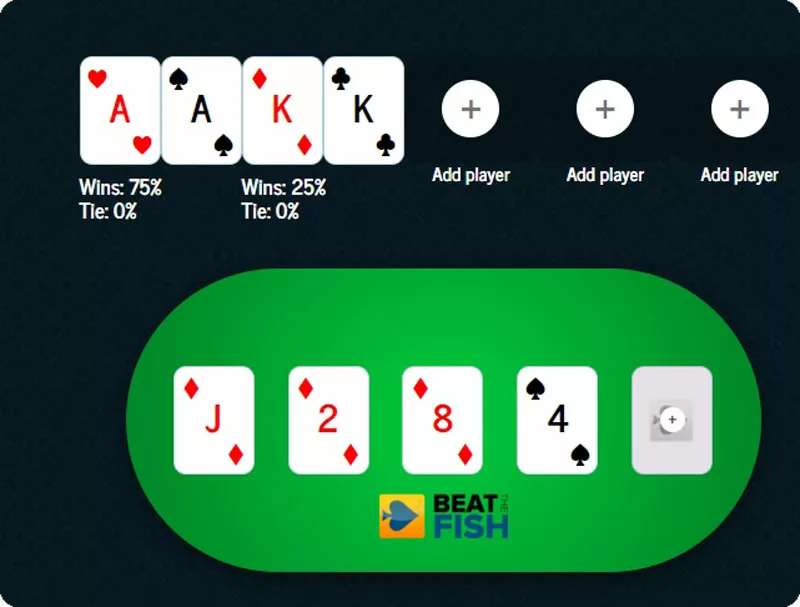
The turn is very good for the Aces, as it doesn’t help the Kings one bit. You can see the Kings are now down to a 25% win percentage. The Kings have 11 outs (9 diamonds and 2 Kings) to win out of 44 unseen cards in the deck, which is 25%.
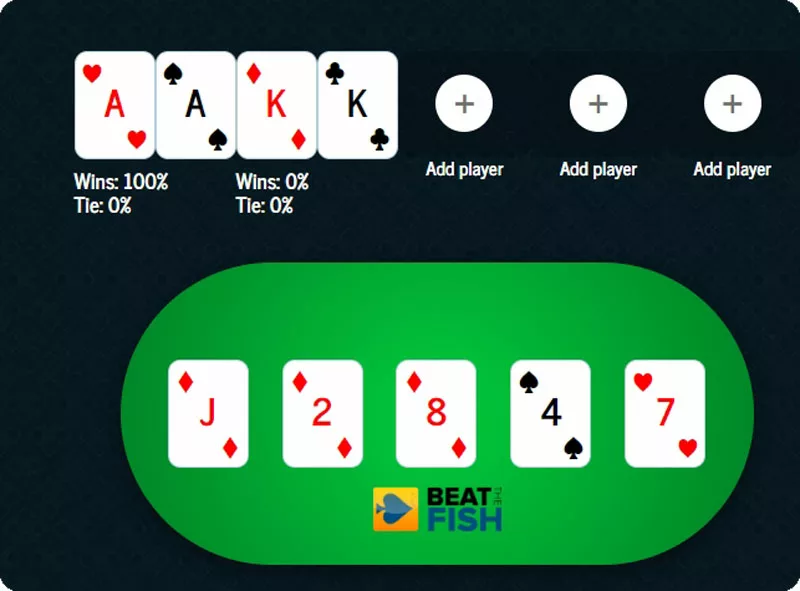
With none of the outs hitting on the river for the Kings, the pocket Aces will win at showdown. If there’s still betting action on the river, which is unlikely given that both players likely have gotten all-in with overpairs to the board, pocket Kings can only win by getting the pocket Aces to fold.
The player with the pocket Aces would only fold if he believed his opponent had a flush, which is the only hand on the board that could beat his.
10-way hand
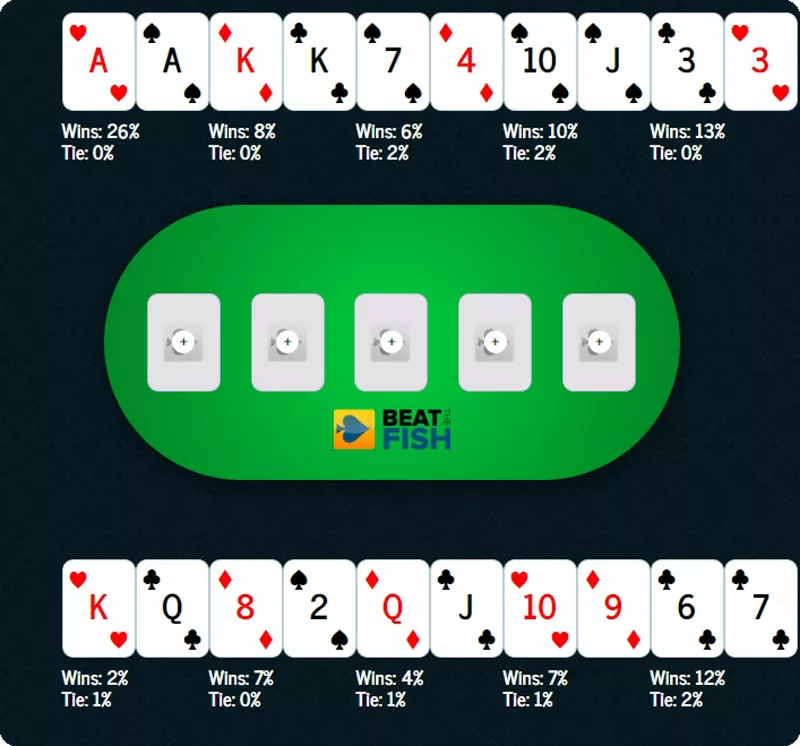
This is a fun example, partially to show the power of this calculator. You can simulate up to 10 players, which is more than you’ll usually have at an online or cardroom table. The interesting point is that even the best starting hand, pocket Aces, drops in equity precipitously with more random hands involved.
A hand that is, at minimum, an 80% favorite against any other single hand drops to around a 1 in 4 favorite against 9 other hands. With premium starting hands, be sure to thin the field and maximize your winning percentage.
Strong pocket pair vs. 4 overcards
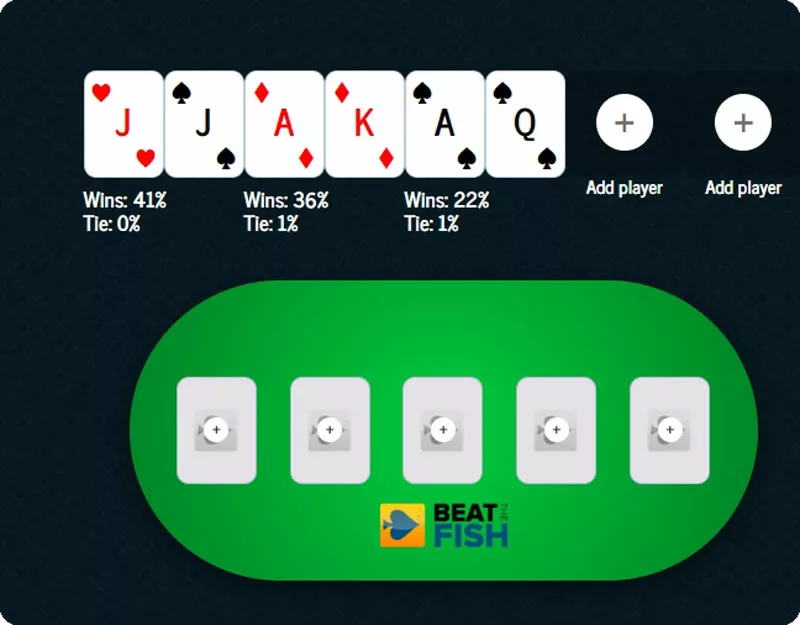
This is another common style of hand, consisting of a strong pocket pair against a couple of opponents with overcards. Let’s say Player 1 put in a nice 4x raise from early position, Player 2 called from middle position with A-K, and Player 3 also called from late position with A-Q.
As always, the made pocket pair is in the best position pre-flop, although the overcards aren’t too far behind in winning percentage by the river.
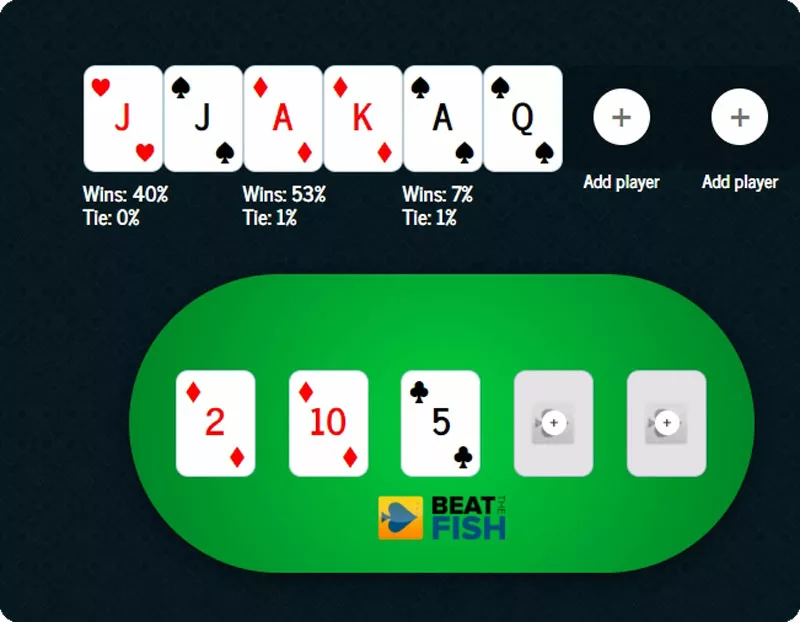
On first glance, this flop seems very good for the pocket Jacks, since no overcards or made straights or flushes are possible yet. Interestingly, however, the calculator shows that Player 2 has become the favorite to win the hand. Besides remaining outs to hit an Ace or King, he now has a flush draw and a backdoor straight draw.
Player 3 should be folding to any bet here unless he wants to bluff. He hasn’t improved his hand at all, aside from a long shot backdoor straight draw. Even if he hits his Ace, he loses to Player 2 because of his lower kicker.
Let’s say Player 1 makes a pot-sized continuation bet, Player 2 calls, and Player 3 folds.
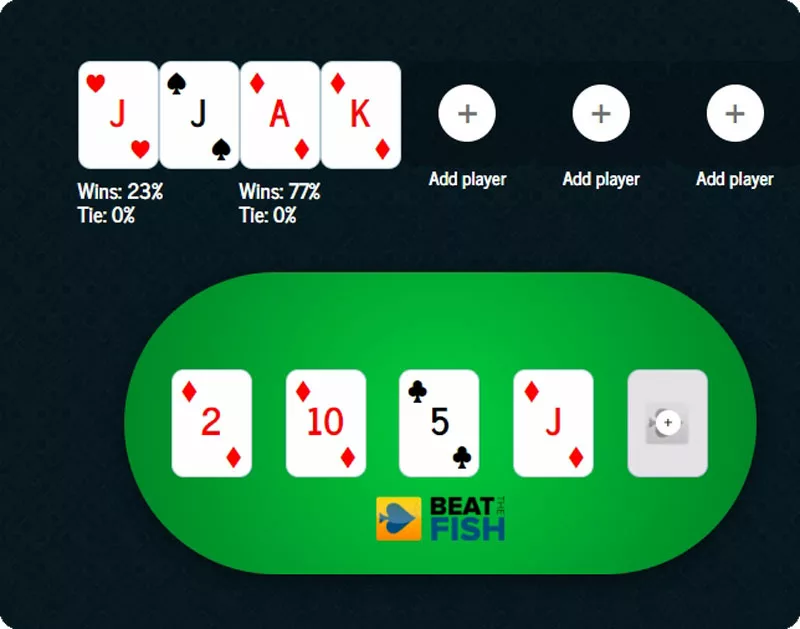
This turn is now sure to set off fireworks. The pocket Jacks have hit a set, but also giving Ace-King the nut flush. This will often end up in an all-in situation, as both players will be very confident in their hands.
Player 2 is a strong favorite, but Player 1 will still win 23% of the time. That’s because he still has 10 outs to improve and beat the flush. He has one more Jack in the deck make Four of a Kind. There are also 3 Twos, 3 Tens, and 3 Fives left that could pair the board on the river and thus give Player 1 a Full House. That’s 10 outs out of 44 unseen cards, or 22.7% (rounded to 23%, as you see in the calculator).
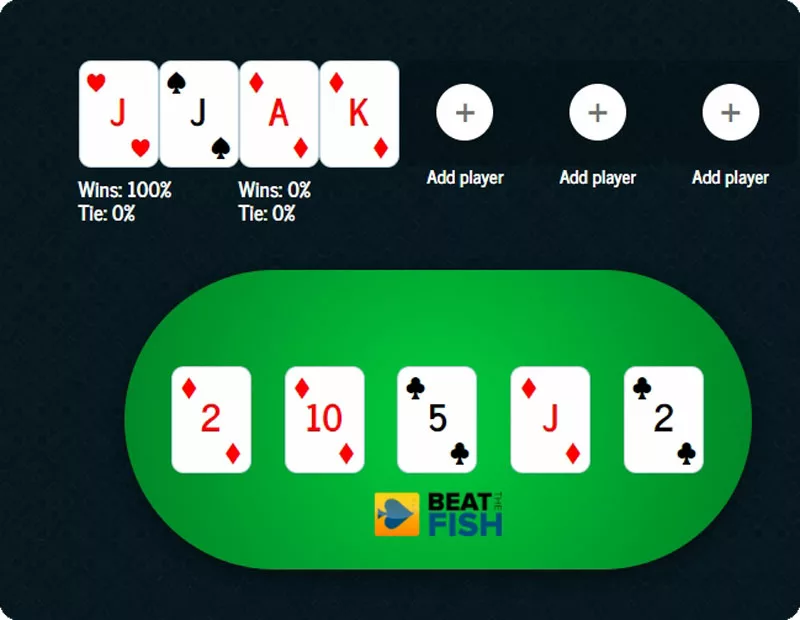
The pre-flop favorite exacts justice and the board pairs on the river to give Player 1 the win. These are exciting types of hands to simulate, where the favorite can change with each betting round. After being playing any hand, you can recreate it using this calculator to confirm that you were betting strongest when you were the favorite.
The Importance of Knowing the Odds
While luck also plays an important role, I wholeheartedly believe that knowledge is power in the ever-evolving landscape of poker so, of course, understanding the odds is a fundamental pillar of success. Mastering the intricacies of probability and equity distribution can propel your game to new heights, elevating you from a fish to a strategic player.
Maximizing Expected Value
At the heart of every successful poker strategy concept lies the concept of expected value (EV). When you accurately assess the odds of various outcomes, you can make decisions that consistently maximize your long-term EV, so you can consistently extract value on the felt.
Whether you’re contemplating a call, raise, or fold, a firm grasp of the odds gives you the knowledge you need to weigh the potential risks and rewards accurately.
Exploiting Opponent Tendencies
Poker is also a battle of wits, so understanding your opponents’ tendencies can provide a significant edge. By combining your knowledge of odds with keen observational skills, you can identify situations where your opponents might be making suboptimal decisions based on incorrect odds assessments.
This insight allows you to exploit their weaknesses, adjusting your play accordingly to capitalize on their mistakes and extract maximum value from the table.
Bankroll Management and Risk Assessment
Effective bankroll management is crucial, and understanding the odds is instrumental in how you manage your money. When you make smart decisions about the risk associated with every bet, fold, and check, you’ll be able to better understand how much money you can spend on buy-ins, which stakes best suit your level of skill, and how often you can afford to take shots.
How A Poker Odds Calculator Works
I spent a lot of time making this Texas Hold’em Simulator and, while it looks very simple, I can assure you that this bad boy can employs advanced algorithms and probability models to meticulously analyze the information you feed it.
At the core of my poker odds calculator, lies a vast database of precomputed probability distributions for every possible combination of hole cards and community cards. These are generated through tons of simulations, where millions of hands are dealt and played out and the frequency of every outcome is recorded.
When you input your specific hand and board information, my simulator cross-references this data with the precomputed probabilities, instantly providing you with the relevant odds and equity percentages.
Common Mistakes
Poker hand simulators are powerful tools but, like any piece of heavy machinery, their misuse can lead to costly errors. In the case of playing poker, that means suboptimal decision-making. These are some common pitfalls you should keep in mind so you don’t make an errors in judgement while using a poker odds calculator.
Overreliance on Preflop Equity
Many players fall into the trap of solely relying on preflop equity calculations, and they simply ignore the dynamic nature of poker hands as the community cards are revealed. It’s this kind of narrow focus that can lead to missed opportunities and incorrect assessments of hand strength.
What you should do instead is embrace the holistic approach by continuously updating your equity calculations as the board texture evolves, accounting for draw potential, board texture, and opponent ranges on top of it.
Ignoring Player Tendencies and Dynamics
There still isn’t a Texas Hold’em Simulator that can analyze what it means when a player suddenly gets a bit too chatty or glances at their chip stack. Observing and interpreting this information is all on you.
Poker odds calculators are oblivious to the nuances of player tendencies, table dynamics, and psychological factors that can significantly influence decision-making.
So, you have to learn to balance the calculator’s output with your own observations and reads on your opponents, adjusting your strategy accordingly to exploit weaknesses and capitalize on opportunities.
Misinterpreting Equity Percentages
Do not take the equity percentages as absolute certainties. You have to understand that these percentages represent long-term averages and that individual hands can deviate significantly from the expected outcome.
Use the calculator as a guide to make mathematically-sound decisions. Don’t rely on it as an invincible soothsayer of short-term results.
Who Can Benefit from Using an Odds Calculator
This kind of tool is for everyone. Don’t feel like you’re too green to be able to interpret the results and, on the other side of the chip, too advanced to benefit from a little bit of help. Whether you’re a seasoned professional or a budding enthusiast, you can get invaluable insights that can really boost your game.
Recreational Players
If you’re a recreational player that wants to enhance your understanding of the game and make more informed decisions, a poker odds calculator can serve as a valuable educational resource.
It can help with visualizing the mathematical underpinnings of various scenarios, so you can develop a deeper appreciation for the intricacies of poker strategy, increasing your overall enjoyment as you learn a bit more about strategy.
Aspiring Professionals
If you’re looking to shift from hobbyist mindset to a more disciplined and analytical approach, using a Texas Hold’em simulator will help take you to the next level. You’ll be able to analyze your play objectively, identify leaks, and refine your strategies based on quantifiable data and probability distributions.
Seasoned Professionals
Even for seasoned professionals at the pinnacle of their craft, poker odds calculators remain an incredibly helpful tool if you want to keep your competitive edge at its sharpest. Poker is always evolving game, where new strategies and approaches constantly emerge. These kinds of tools can help you stay ahead of the curve by exploring complex scenarios and testing your theories.
Integrating Odds Calculators into Your Study Routine
The true potential of using a poker odds simulator is realized when it’s seamlessly integrated into a comprehensive study routine. By adopting a structured approach to learning and practice, you can maximize the benefits of these calculators and accelerate your growth to become a more successful poker player.
Analyzing Hand Histories
One of the most effective ways to leverage poker odds calculators is by incorporating them into your hand history analysis. By inputting the relevant information from past sessions into the calculator, you can gain invaluable insights into the equity distributions, potential missed opportunities, and areas for improvement.
This process not only reinforces your understanding of odds and equity but also enables you to identify leaks in your decision-making process, allowing you to make data-driven adjustments.
It also helps when you’re talking through hand histories on forums or with friends. You can use the calculators to show why you made specific decisions, and even run through different scenarios together to come up with new ways to improve your strategy.
Exploring Theoretical Scenarios
By simulating a range of board textures, ranges, and betting patterns, you can gain a deeper understanding of the intricate interplay between equity, pot odds, and implied odds. This kind of studying will help you prepare for a wide range situations that you might encounter in a game or tournament.
Structured Practice Sessions
Integrating poker odds calculators into your structured practice sessions can be a game-changer. By simulating various scenarios and inputting your decisions into the calculator, you can receive immediate feedback on the accuracy and profitability of your plays.
This iterative process of decision-making, analysis, and adjustment not only reinforces your understanding of odds and equity but also cultivates a habit of critical thinking and self-evaluation. These are essential traits if you’re going to want to make it as a successful player in the long-term.



